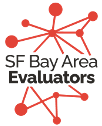
I am Tamara Hamai, President of Hamai Consulting and the coordinator of the San Francisco Bay Area Evaluators (SFBAE), the AEA affiliate for the San Francisco Bay Area and its surrounding areas. This week for AEA365 is brought to you by SFBAE, with articles written by SFBAE members and focused on the value of community for evaluators and evaluation.
The work we do as evaluators and the work that the people we work with as we conduct evaluations is often immersive and motivated by social justice and human rights activism. Many of us got into this kind of work because we know that we can and need to make this world a different, better place for ourselves and for others. This intrinsic purpose, however, can make us vulnerable to emotional and physical exhaustion and, possibly, lead to burnout (Chen & Gorski).
If you’re like me, you’re in this for the long haul. You’ve rode the roller coaster of emotion, dancing to the beat of inspiration and passion, and coasting down through periods of hopelessness. At times, you may have sacrificed your physical, psychological, and emotional health for the change you’re making in the world. You put your whole ass self into this work.
How do you sustain yourself and the impact you’re creating?
Community.
Communities are groups of people who are unified by geography, common interests (professional, social, economic, or political), common characteristics, having a common history, their interactions with policy, their interactions with each other in a social activity, or joint ownership (Merriam-Webster). Being an active member of a community will help you sustain yourself by connecting you with other like-minded people and giving you a sense of belonging, validation, inspiration, and hope. Engaging with and working with communities strengthens and supports your evaluation efforts, while increasing the quality and use of the evaluation results.
Hot Tip

AEA local affiliates may be the community you need. Local affiliates are communities of people working in or interested in evaluation in a specific geographic area (for SFBAE, that’s the San Francisco Bay Area and its surrounding areas).
Local affiliate communities are places where someone always “gets” your data frustrations, can introduce you to new and interesting trends, and share in cheesy evaluation jokes! For SFBAE, we aim to help our members:
- Build relationships with other people who can teach you things, learn from you, connect with job opportunities, act as thought partners, celebrate your wins, commiserate with, and more.
- Be part of a community of practice to share knowledge with others, collaborate and communicate with the community, and take part in collective learning.
- Connect in-person at social events.
- Discover new tools and resources.
- Engage in professional development activities.
- Stay connected with AEA and other AEA affiliates, so they can stay on top of current trends and opportunities.
- Always have a place to ask questions and get support.
What community helps you sustain yourself and the impact you’re creating?
Do you have questions, concerns, kudos, or content to extend this aea365 contribution? Please add them in the comments section for this post on the aea365 webpage so that we may enrich our community of practice. Would you like to submit an aea365 Tip? Please send a note of interest to aea365@eval.org . aea365 is sponsored by the American Evaluation Association and provides a Tip-a-Day by and for evaluators. The views and opinions expressed on the AEA365 blog are solely those of the original authors and other contributors. These views and opinions do not necessarily represent those of the American Evaluation Association, and/or any/all contributors to this site.
